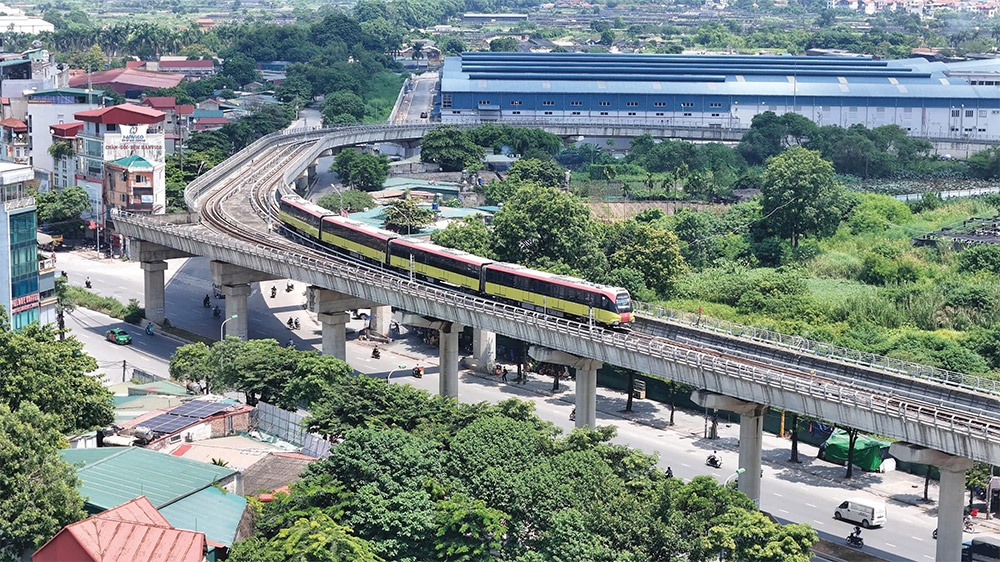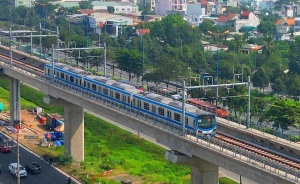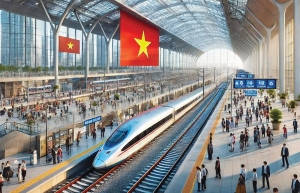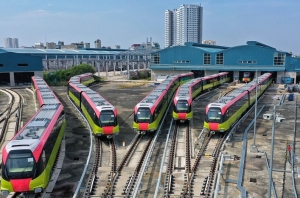Local groups poised to work on $67-billion railway
In October and November, chairman of Hoa Phat Group Tran Dinh Long and a team of technology experts visited some of the world’s top steel rail factories, such as Danieli and SMS, in Europe to learn more about manufacturing the type of steel required for the North-South high-speed railway, approved by the legislature last week.
 |
| Local groups poised to work on $67-billion railway |
“Hoa Phat is confident it can supply an estimated volume of six million tonnes of steel required for the project, particularly high-strength prestressed steel and that for specialised high-speed rail tracks,” said Long. “The corporation has conducted research on steel rail over the past three years, thus the group is confident it can provide steel meeting international standards as well as the railway project’s technical demands, especially with its competitive prices over those of imported products.”
Experts said that the railway will generate steady, long-term demand in multiple industries, bringing breakthrough opportunities for the steel sector. According to Deputy Minister of Planning and Investment Tran Quoc Phuong, the railway project will directly impact up to eight sectors, comprising construction and supporting industries such as building materials and manufacturing.
Meanwhile, infrastructure developer Deo Ca Group has proposed mechanisms to leverage existing resources of enterprises that have been involved in the North-South Expressway project. The corporation also suggested prioritising domestic firms with sound management capability and creating opportunities for local businesses along the railway route.
“The state should support domestic firms to have opportunities to learn the experience from large-scale foreign groups in implementing big transport projects. Another important proposal is that the government and local authorities need to support the firms in land clearance and material mill preparation, which are two main reasons that can cause delays,” said Nguyen Quang Huy, general director of Deo Ca Group.
Pham Ngoc Trung, a construction materials expert, acknowledged that the high-speed railway needs a large amount of steel for infrastructure works such as bridges, stations, rails, and other support systems.
“High-quality steel components will be served for the construction of stations, overpasses, tunnels, and other works. Along with the main railway project, urban development projects and other supporting projects will also consume a large amount of steel, such as transportation systems, yards, and industrial parks along the railway line,” Trung said.
To show their bold commitment to participating in the high-speed railway, domestic firms are to implement training courses to prepare staff. Hoa Phat Dung Quat Steel is cooperating with the School of Materials at Hanoi University of Science and Technology to organise in-depth training courses on high-quality steel products.
In late November, Deo Ca Group and Ho Chi Minh City University of Transport (UTH) held the opening ceremony of a railway training course for more than 130 students.
“We have strengths in personnel and finance, and are researching and learning about international units with experience and reputation in railway technology to cooperate, aiming to localise production activities for the high-speed railway,” said Huy of Deo Ca Group. “The group conducted business trips to China, Japan, and Europe for research and to invite international units to cooperate. The group is also proactively seeking digital transformation solutions while aiming to participate in the production of carriages to increase the localisation rate according to the government’s strategy.”
Assoc. Prof. Dr. Nguyen Anh Tuan, vice principal of UTH, said, “Preparing conditions in terms of technology, people, and facilities is an urgent requirement. The first training course will be completed in over a year, and these trainees will be a resource for implementing the pre-feasibility and feasibility reporting stages for the high-speed railway.”
In October, Deputy Minister of Transport Nguyen Danh Huy stated that project construction would be mostly funded by the state budget, with few constraints on foreign tech transfer. “If foreign contractors participate, the prerequisite is to use domestic goods and services, creating conditions for domestic enterprises to participate with a construction value of up to nearly $34 billion,” said Huy.
The Ministry of Transport assessed that with the current domestic capacity and level, the ability to localise and master tech between the speed ranges of 250-350km per hour are similar. If domestic firms are transferred tech and offered preferential mechanisms, they can master construction, be self-sufficient in all operations and maintenance work, and gradually localise the production of some components and spare parts.
 | Metro Line 1 begins trial runs at full capacity The first metro line in Ho Chi Minh City, linking Ben Thanh Market in District 1 to Suoi Tien in Thu Duc, is conducting trial runs at full capacity from November 11 to 17. |
 | Major railway requires debt considerations Concerns have been raised regarding the investment capital schemes and public debt safety for the national project to construct the North-South high-speed railway, an iconic venture anticipated to boost economic growth significantly. |
 | The Capital Law to help develop Hanoi's railway system The Capital Law, set to take effect in January, permits investment in the development of Hanoi's urban railway system, prioritising the Transit-Oriented Development (TOD) model to ensure modernity, compatibility and sustainability. |
What the stars mean:
★ Poor ★ ★ Promising ★★★ Good ★★★★ Very good ★★★★★ Exceptional
 Tag:
Tag:
Related Contents
Latest News
More News
- Vietnam, New Zealand seek level-up in ties (February 19, 2026 | 18:06)
- Untapped potential in relations with Indonesia (February 19, 2026 | 17:56)
- German strengths match Vietnamese aspirations (February 19, 2026 | 17:40)
- Kim Long Motor and AOJ Suzhou enter strategic partnership (February 16, 2026 | 13:27)
- Haiphong welcomes long-term Euro investment (February 16, 2026 | 11:31)
- VIFC in Ho Chi Minh City officially launches (February 12, 2026 | 09:00)
- Norfund invests $4 million in Vietnam plastics recycling (February 11, 2026 | 11:51)
- Marico buys 75 per cent of Vietnam skincare startup Skinetiq (February 10, 2026 | 14:44)
- SCIC general director meets with Oman Investment Authority (February 10, 2026 | 14:14)
- G42 and Vietnamese consortium to build national AI infrastructure (February 09, 2026 | 17:32)






















 Mobile Version
Mobile Version